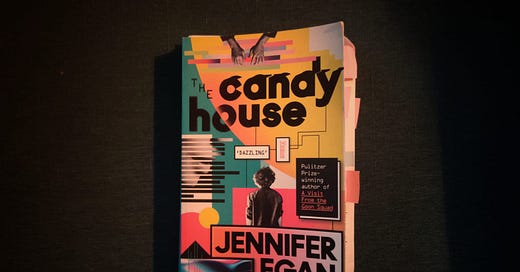Fiction, 2022
To my abject horror, I’ve been thinking a great deal about free will recently. All of my thoughts on the subject are trite and boring, but in my research, there are two questions I keep going back to: a) what did I cause today? b) what cause am I the product of today? I think about my answers in the afternoon, when my blood sugar dips and the house grows quiet. It was during this time that I read Jennifer Egan’s The Candy House, a novel that entwines these questions in a manner both dazzling and dizzying to tell a story of cause and effect that spans decades.
It’s the 2010s in New York City, and Bix, a tech entrepreneur (read: sans cringe), has hit a creative wall. By combining obscure anthropology with code, he revolutionised social media models of data collection. But now, he finds himself distanced from the world he’s been instrumental in creating. So he’s walking along the East River, thinking of his friend who drowned in it decades ago. Sometime in the future, a passerby to the accident is thinking of the same event. Does that mean that Bix and the stranger are connected? If they both knew of another witness to the event, would that cause catharsis or alienation? We're in Egan’s playground, and she is having fun.
Other characters include a man who performs stunts of “authenticity” (screaming in public places to gauge the reactions of strangers), a young girl who makes a new friend on a humid, mosquito-ridden evening, and a recovering heroin-addict who plays Dungeons & Dragons in between rounds of chemotherapy. To read The Candy House is to attend a party filled with the kinds of fascinating people one usually only finds on public transport—at a glimpse, on the fringe. Savour it well.
Song - Tom’s Diner
Film - Paris, Texas





I loved this book but well I just love Jennifer Egan
wow this is my next read